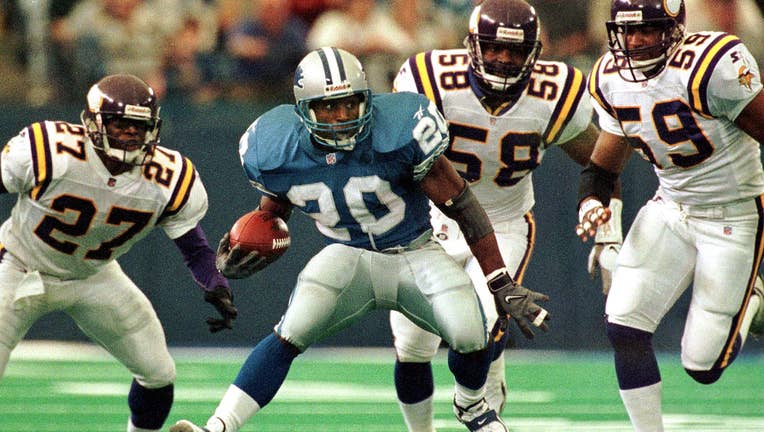Why Barry Sanders retired: Lions legend explains his shocking decision

Detroit Lions running back Barry Sanders tries to outrun Minnesota Vikings defenders Corey Fuller, Ed McDaniel and Dixon Edwards during the fourth quarter of their October 25 game at the Silverdome in Pontiac, Michigan. The Vikings beat the Lions 34-
DETROIT (FOX 2) - It's been almost 25 years since the best running back in the NFL shocked the sports world with his decision to step away while at the top of his game. Why he did it remained a mystery to most – until now.
Barry Sanders, a man who needs no introduction in Detroit or in the NFL world overall, stunned everyone in the summer of 1999. Just as the Detroit Lions were about to start summer camp, they received a fax from their star running back: he was retiring.
Sanders' story is told by Amazon in the new documentary Bye Bye Barry and he's explained why he left.
"For me, just that thing that drove me to play, which is that passion, just wasn't there," Sanders said in the documentary. "There was nothing really left to play for. I didn't see us as any kind of a serious Super Bowl contender. ... I felt like I was making a pretty clear decision. I just felt like, in my mind, this is pretty much it."
'F you all!': Ex-Lion QB Scott Mitchell blasts critics in new Barry Sanders Amazon doc
This isn't all that different from the statement he wrote in July 1999 when he told The Oklahoman that he was retiring because he didn't have the desire to play as he had before.
"The reason I am retiring is simple: My desire to exit the game is greater than my desire to remain in it. I have searched my heart through and through and feel comfortable with this decision."
The 90-minute documentary will likely be widely played in and around Detroit this Thanksgiving as we'll learn more about the factors that ultimately led to Sanders no longer wanting to play. But the largest of the reasons seems to be relatively simple: The Lions weren't good and Sanders knew he couldn't go any further with the team that surrounded him.
In 1998, the Lions went 5-11 and had parted ways with the stars that surrounded Sanders during his first few seasons.
The Lions' inability to win has been well-documented for decades but in the early 90s, Sanders and the Lions were seen as an up-and-coming team that could contend for Super Bowls. They were widely seen as a chief opponent in the NFC for the Dallas Cowboys – who were also trending upwards at that time.

Lions preparing for Packers, Thanksgiving tradition
Jennifer Hammond reports from Allen Park on Tuesday where the Lions continued preparations for their Thanksgiving Day battle with the Packers.
In January 1992, the Cowboys came to Detroit in the divisional playoff round and got smoked 38-6 as Sanders ran for 69 yards and a touchdown. Quarterback Erik Kramer went 29-38 for three touchdowns and 341 yards. Cowboys' QB Troy Aikman, for context, threw for just 114 yards on 11 of 16.
The NFL was different then with passing over 300 a rare feat. But Kramer and the Lions were red hot that day.
Nobody knew on January 5, 1992, that it would be the last time Lions fans would watch their team win a playoff game. They would go on to lose to Washington 41-10.
Between the 1992 season and the 1997 season, they would win a wild card spot four times – but lose in the first round each time. Even in the year Sanders retired, they would reach the wild card stage – only to be bounced by Washington again.
How to watch Detroit Lions vs. Green Bay Packers on FOX 2 for Thanksgiving
Since then, we all know the story, only three playoffs since the millennium.
Lions fans have spent years thinking ‘what if’ one of the best players for this position of all time hadn't retired at his prime? We'll never know.
"You go to war and go to battle with those guys, you form a bond, obviously," Sanders said. "Some of the guys that they may have brought in to replace those guys were just not the same, but you've got to take the field with the guys you practice with. ... Had that group been able to stay together, somehow, we definitely could have done much better and definitely would have won some playoff games."
Sanders stepped away despite being 1,458 yards shy of breaking Walter Payton's career rushing record – a record he likely would have broken in 1999. That was ultimately broken by Emmitt Smith but many feel Sanders could have been the first running back to rush for 20,000 yards.
In 2004, he was the second-youngest player ever to be inducted into the Pro Football Hall of Fame.

'The Perfect 10': Football great Barry Sanders talks new documentary
It is the most elite club in the history of football -- a new documentary, "The Perfect 10," showcases one of the rarest dual accomplishments in sports. Ten men have won the Heisman Trophy and are Pro Football Hall of Famers. Seven of them got together to share stories and look back. Barry Sanders is one of them.

